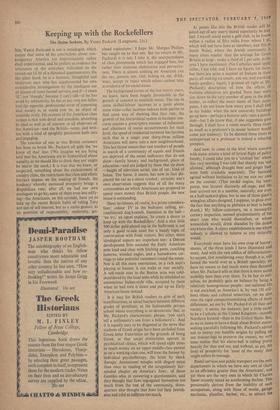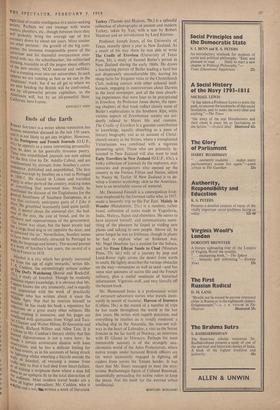Keeping up with the Rockefellers
The Status Seekers. By Vance Packard. (Longmans, 21s.)
MR. VANCE PACKARD is not a sociologist, which means that some of his conclusions about con- temporary America are impressionistic rather than experimental, and he prefers as evidence the utterances of the articulate individual to the sieved-out LCM of a thousand questionnaires. On the other hand, he is a humane, thoughtful and observant man who has supplemented his own considerable investigations by the intelligent use of dozens of more formal surveys, and if-1 mean 'if,' not 'though,' because I can't tell—if he has erred by subjectivity, he has at any rate not fallen into the opposite, professional error of supposing that society is, or could ever be, an object of scientific study. His account of the American class system is rich with detail and anecdote, absorbing to read as well as of concern to all observers of the American—and the British—scene, and writ- -ten with a kind of sprightly pessimism both rare and engaging.
The reaction of one or two British reviewers has been to brush Mr. Packard off with the 'we knew all that' line. ('We imagine we are being told that the Americans are as hypocritical about equality as we should like to think they are' might be nearer the mark.) It is true that we knew, or suspected, something about the exclusiveness of country clubs, the restrictions that class and ethnic barriers impose on the making of friends, the tendency whereby increased prosperity brings a Republican vote; after all, we had our own analogues to go by, some of them even less edify- ing—the Americans, on this account, have yet to take up the recent British habit of voting Tory not out of self-interest, but as a status gesture, as an assertion of respectability, modernity, get-
ahead aspirations : I hope Mr. Morgan Phillips has caught on to that one. But (to return to Mr. Packard) it is not, 1 take it, the unexpectedness of class phenomena which has engaged him, but rather their immense elaboration and pervasive- ness. There is almost nothing an American can do, say, possess, use, visit, belong to, eat, drink, wear, accept or reject which others cannot take as evidence of his social status.
The background events of the last twenty years, we learn, have been hugely favourable to the growth of concern to establish status. The rise in some skilled-labour incomes to a point above some white-collar incomes induces both parties to find some way of showing that they rate; the growth of the hierarchical system in business con- cerns enjoins a prescriptive manner of behaviour and allotment of social accoutrements for each level; the speed of residential turnover has become such that in a single year thirty-three million Americans will move into a new neighbourhood. This last factor means that vast numbers of people in search of a community of equals and friends are deprived of the social indicators that do not show—family history and background, place of education—and are judged by those that do show —height of television aerial, size of car, kind of house. The home, it seems, has now in fact dis- placed the car as a status symbol : certainly one's own observation suggests that of all the many commodities on which Americans are prepared to spend more money than British people, the new house is outstanding.
Sheer lavishness, of course, is a prime considera- tion : colour TV in the bedroom ceiling, air- conditioned dog-kennels, fountains in the hall— 'we try,' an agent explains, 'to create a desire to keep up with the Rockefellers.' And a nice little 500-dollar gold-plated tap in the bathroom is not only a good re-sale asset but a handy topic of conversation with fresh visitors. But other, more ideological aspects are important too: a Detroit development firm sounded the Early American note loud and clear with hitching posts, coaching lanterns, wooden eagles, and a horsedrawn car- riage to take potential customers round the estate. Nor is all this mere ostentation, or a rich man's playing at houses; it can make or mar socially. A self-made man in the Boston area was cold- shouldered by the local nobs while he inhabited an ostentatious Italian-style villa, accepted by them when he had torn it down and Put up an Early American house instead.
It is easy for British readers to grin at such manifestations, at social barriers between different grades of prostitute, at the fashionable private school where everything is so democratic that, in Mr. Packard's characteristic phrase, 'you can't tell a millionaire's son from a billionaire's.' And it is equally easy to be disgusted at the news that students of Greek origin have been excluded from Greek-letter fraternities on the grounds of being Greek, or that social distinctions operate in psychiatrical clinics, which will spend eight times as much money on an upper-middle-class patient as on a working-class one, will treat the former by individual psychotherapy, the latter by shock therapy. Amusement mingles with disgust more than once in reading of the scrupulously fair- minded chapter on America's Jews: of those Gentiles who, in answering a questionnaire, said they thought that Jews segregated themselves too much from the rest of the community., three- quarters also thought that Jews hid their Jewish- ness and tried to infiltrate too much. At points like this the British reader will be jolted out of any merry moral superiority he may feel. I myself could name a golf club, to be found within a radius of fifty miles from where I sit, which will not have Jews as members, and this in South Wales, where the Jewish community is many times smaller than the average for Great Britain at large : under a third of 1 per cent. in the area I have mentioned. (No Catholics need applY either, I am told, and I have no figures for them, but there are quite a number of Italians in these parts, all making ice cream, you see, and cranking hurdy-gurdies.) Again, I grinned all right at Mr. Packard's description of how the offices of business executives are graded, from their mere size down to the very number of pens in the desk holder, to reflect the exact status of their occu- pants. I do not know how many pens I shall find in my holder when the new university buildings go up here—perhaps a lecturer only rates a pencil- stub—but I do know that, if one suggestion goes through, I shall have a room exactly three times as small as a professor's (a senior lecturer would come just midway). To be deemed three times as unimportant as a professor is indeed a sobering prospect.
And now, to come to the level where concern with status attains a kind of lyrical flight of paltry fatuity, I could take you to a 'cocktail bar' where this very morning I was told that shandy was 'not allowed,' although draught beer and ginger beer were both available separately. The barmaid agreed without hesitation to let me mix my own on the counter. (That sordid engine, the beer- pump, was located discreetly off-stage, and the beer arrived not in a tumbler, naturally, nor even in a half-tankard-glass, but in one of those giant's wineglass affairs designed, I suppose, to gloss over the fact that anything so plebeian as beer is being drunk.) My fellow-customers, on a necessarily cursory inspection, seemed predominantly of the exact type who would themselves, or whose womenfolk would, drink shandies by the dozen anywhere else. A classy establishment is one where nobody is allowed to behave as you naturally would.
Everybody must have his own crop of horror- stories, of the three kinds I have illustrated and more. And with the vast edifice of differentiation- by-accent, fast mouldering away though it is, still famed the world over as a British speciality, we have no reason to feel much more than flattered when Mr. Packard tells us that there is more social mobility here than over there. To be fair to our- selves, we probably gain on balance by being a relatively homogeneous people: our national life is not enriched, as America's is, by vast (50 mil- lion) ethnic and cultural minorities, yet we also
miss the rigid compartrfientalising effects of these differences, set out by Mr. Packard in all their sad variety : it seems, for instance, just a little easier to be a Catholic in the United Kingdom—outside Northern Ireland—than in the United States. But,
as we sit down to have a think about British status-
seeking (carefully following Mr. Packard's advice not to betray our humble origins by pulling up our trouser-legs to preserve the crease), we very soon realise that his alarm-bell is tolling pretty heavily for thee and me, and without, as yet, the level of prosperity for 'most of the many' that might soften its message.
Postal services and public transport are the only departments in which we have any sort of claim to an efficiency greater than the Americans', and yet these are the very ones in which Sir Charles Snow recently noted an accelerating decline. This presumably derives from the inability of such occupations, along with those of waiter, garage mechanic, plumber, barber, etc., to attract the
right kind of middle intelligence in a status-seeking society. Perhaps we can manage with worse waiters, plumbers, etc., though between them they will probably bring the average age of first coronary down by about ten years. More sinister are other portents : the growth of the big com- panies; the immense irresponsible power of the advertiser and his shameful overpayment com- pared with, say, the schoolteacher; the militarised III‘inking, traceable in all the jargon about officers e` the new society, NCO material and suchlike, that is creeping even into our universities. In such spheres we are running as fast as we can in the
Americans' track; but if we all get to where we are
„ now heading the British will be confronted, not by all-powerful private capitalism, as the Americans will, but by an all-powerful State. California, here 1 come.
KINGSLEY AMTS











































 Previous page
Previous page